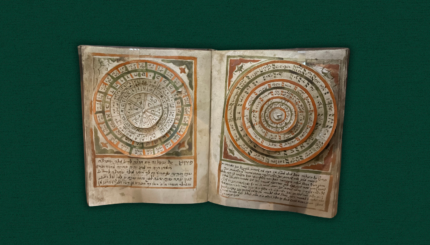It is important to elaborate on a few points raised in this article. 1) Merkavah (chariot) mysticism is the basis of the early stages of Kabbalah. 2) The description of the prophet’s vision is poetic, and as such it transcends not only human imagination, but also the limits of the language. 3) Mystics of other faiths also transcended the limits of the language in trying to convey their encounter with God. Reprinted with permission from The Haftarah Commentary published by Union of Reform Judaism.
Innumerable attempts have been made to translate the descriptions of this complex vision into a comprehensible visual image, but none of them has been able to gain general support from the many scholars who have studied the text. Obviously, there are wheels and faces, but the way they move in all directions, and the wheels within wheels, present difficulties that cannot be overcome. This kind of vision, and especially the Prophet’s description of the divine throne, bursts the limits of the ordinary and has a reality all of its own.
No wonder, therefore, that those who believed that Ezekiel’s experience had a deeper meaning endlessly explored the text for hidden allusions and mystical messages. A whole literature sprang up around this chapter, which has become ma’aseh merkavah, chariot mysticism.
Students pored over the words–to such an extent that there was strong opposition to their introduction as the haftarah [prophetic reading] for Shavuot. In the end, Rabbi Judah’s permissive opinion prevailed, for after all, what pious person would not wish to understand the secrets of such a religious vision! (See Mishnah Megillah 4:10.)
With your help, My Jewish Learning can provide endless opportunities for learning, connection and discovery.
Still, asking just exactly what Ezekiel had seen is asking the wrong question altogether. The prophet had an overwhelming experience that he tried to convey to others. As a descriptive exercise, his attempt failed for his words could not manage to convey with any sense of clarity what his spiritual eye had seen. But, unwittingly perhaps, he thereby suggested to his contemporaries, and the thousands of others who studied his words, that the Presence of God is forever beyond human description.
Haftarah
Pronounced: hahf-TOErah or hahf-TOE-ruh, Origin: Hebrew, a selection from one of the biblical books of the Prophets that is read in synagogue immediately following the Torah reading.
Mishnah
Pronounced: MISH-nuh, Origin: Hebrew, code of Jewish law compiled in the first centuries of the Common Era. Together with the Gemara, it makes up the Talmud.


